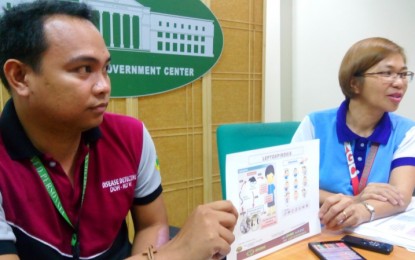
LEPTO WARNING. Dr. Grace Tan (right), head of Bacolod CHO Environment Sanitation Division, and Dee Apolinario of the Disease Surveillance Office-Bacolod City, show a flyer with tips on leptospirosis prevention during a press briefing on Monday, Aug. 13, 2018. (Photo by Nanette L. Guadalquiver)
BACOLOD CITY – The City Health Office (CHO) warned residents here anew to exercise caution against leptospirosis as cases increased by 50 percent from January 1 to August 4 this year.
Records at the Bacolod City Epidemiology and Surveillance Unit showed that during the period, 15 cases, including two deaths, were reported. For the same period last year, there were 10 cases, including three deaths.
After August 4, a third death was also reported in Bacolod.
The three fatalities this year were all males, including a 61-year-old who died in the first week of June, a 27-year-old who passed away in the first week of August, and a 28-year-old who died recently.
Leptospirosis is a bacterial infection caused by the leptospira spirochetes bacteria contracted through the urine of infected animals, especially rats.
Exposure to flood waters can cause infection, especially to those with cuts, wounds or abrasions on their skin.
In a press briefing on Monday, Dr. Grace Tan, head of CHO Environment Sanitation Division, said leptospirosis cannot just be acquired by wading in flood waters, but also through ingestion of contaminated food and water.
“Make sure there are no rats in the vicinity. Rodent control is the primary preventive measure against leptospirosis,” she added.
The symptoms of the disease include high fever, muscle pain, eye redness, chills, severe headache, vomiting, diarrhea, or yellowish skin discoloration.
“If you have these symptoms, don’t hesitate to come and visit your health center especially if you have history of wading in flood waters,” Tan said.
She added that those who face high risk of infection are people who work in sewerage systems and manholes who can be given dosage of prophylaxis as a preventive measure.
According to the Department of Health, the incubation period for those exposed to the bacteria is seven to 10 days.
If left untreated, DOH said, lleptospirosis may cause kidney failure, brain damage, massive internal bleeding, and death. (PNA)
